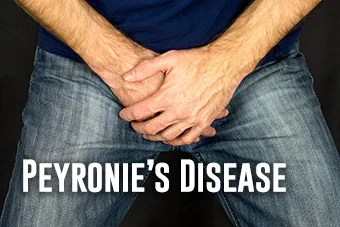Peyronie’s Disease, which Z Urology can help you with, is when scar tissue forms under the skin of the penis and cause it to bend. Living with this condition often includes pain and changes to sexual function that can affect personal intimacy, relationships, and mental health.
Understanding the ways Peyronie’s Disease can affect your sex life and partner can help you know what to expect from the disease, along with how treatment options can help.
Here are five things to know about Peyronie’s disease and sex.
1. Getting & Keeping Erections Can Be Challenging
Erectile dysfunction is actually more common amongst those with Peyronie’s disease. A 2020 study on 656 men who were receiving care at a urology clinic in Brazil found that nearly 60% of men with Peyronie’s disease had erectile dysfunction, compared with 46% of men without.
There are a few possible reasons for the connection between Peyronie’s disease and erectile dysfunction. For many, the scarring can make it difficult to get an erection. Erections can also be challenging if the nerves or blood vessels of the penis have been damaged by inflammation or trauma to the penis, which is associated with Peyronie’s disease.
Many people living with Peyronie’s experience anxiety and depression because of the condition. These feelings can also lead to challenges with sexual function, so the symptoms often compound each other.
2. Your Partner May Experience Pain & Discomfort
Peyronie’s disease often causes pain during erections. But that condition doesn’t only cause pain to those living with it. It can also make sex uncomfortable for their partners. Nearly half of the female sexual partners of men with the condition experienced at least moderate pain or discomfort during vaginal intercourse. In some cases, couples couldn’t engage in certain sexual activities they enjoyed before the onset of Peyronie’s.
With that being said, the appearance of the penis might not be as much of an issue to one’s partner. The research found that nearly 60% of men with Peyronie’s disease were very or extremely bothered by how their erect penis looks, while just 20% of their female sexual partners felt the same way.
3. Communication Helps Couples Cope
While it is difficult to talk about Peyronie’s disease, communication is key to maintaining intimacy with your partner and finding new ways to be sexual.
Here are some ways to make the conversation easier, according to the Association of Peyronie’s Disease Advocates (APDA):
- Discuss the condition and its effects over several conversations. Don’t feel like you have to cover everything in one sitting.
- Your feelings and symptoms can change over time, so you may need to revisit topics in future conversations. Try to be honest about what you’re going through.
- Make sure the conversation is a dialogue, not a monologue. As much as you share your concerns, listen to your partner express how your condition is affecting them, as well.
4. Over-the-counter Meds Can Provide Pain Relief
Treatments for Peyronie’s disease, which range from injections to surgery and penile implants, usually have the goal to reduce curvature and improve sexual function.
However, not all people with the condition need medical treatment. If pain is the main symptom, Over-the-counter pain relievers, such as nonsteroidal anti-inflammatory drugs like ibuprofen or naproxen, might be all you need to have a more comfortable erection.
5. Treatments Can Boost Sexual Satisfaction
There are a number of surgical and nonsurgical treatments for Peyronie’s disease. While they’re typically focused on reversing curvature and breaking up plaques, some treatments have the added benefit of boosting satisfaction for partners of people with the condition. A study found that 70% of female partners of men with Peyronie’s disease who were treated with collagenase clostridium histolyticum injections experienced higher sexual satisfaction.
Female partner sexual satisfaction also climbed by 34% to 88% when men were treated with penile plication, 90 to 100% after they underwent plaque incision or partial excision with grafting, and 40 to 75% after penile prosthesis implantation (a treatment typically reserved for people with severe Peyronie’s disease and erectile dysfunction).
Peyronie’s disease can make a big impact on a person’s sex life, both due to the physical symptoms and the emotional impacts of the condition. The condition can also make an impact on your partner’s comfort and satisfaction during sex.
Exploring treatment options with Z Urology, having open and honest conversations, and seeing a sex therapist are some of the ways to reduce the effects of Peyronie’s disease on intimacy.
If you feel you are in need of a urologist in South Florida to aid in Peyronie’s Disease, then contact Z Urology for a group that is dedicated to delivering world-class expertise in urology, along with an unwavering commitment to their patients. The three locations to choose from are located in Fort Lauderdale, Coral Springs, and Pompano Beach.
You can go to the website directly and set up an appointment or you can call 954-714-8200. Either way, you contact, you will be setting up to see the leading urologist office in all of South Florida. With an extremely talented and professional staff of doctors and more, you are in truly good hands with the doctors and nurses at Z Urology. Z Urology is your leader in urological care. Go ahead and call now!



Recent Comments